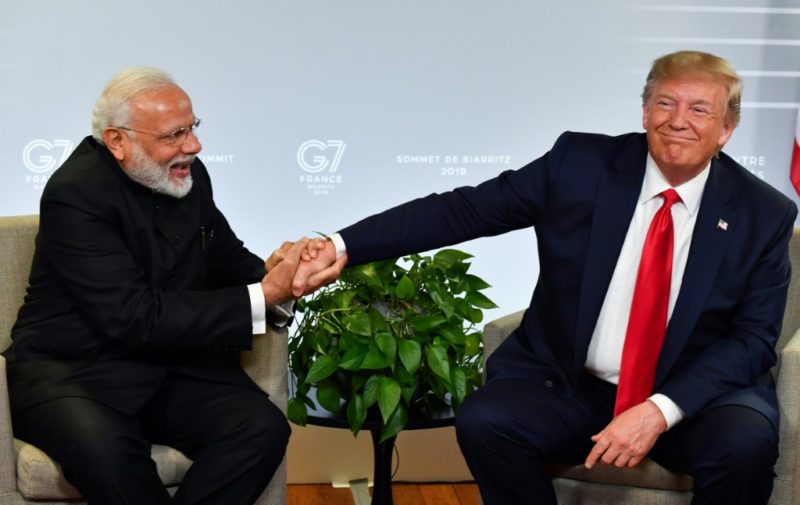Modi’s Deftness At G7 Galvanizes World Support on Kashmir
President Donald Trump said, Aug. 25, in France, he had no need to help mediate between Pakistan and India over tensions in disputed Kashmir because Indian Prime Minister Narendra Modi feels he has it “under control.” (AFP photo)
India’s Prime Minister Narendra Modi, who was personally invited by the French President Emmanuel Macron to attend the G7 Summit from the sidelines held at Biarritz in France has come back with flying colors, with enhanced global support for India’s position in Kashmir, in that the scrapping of Article 370 in Jammu & Kashmir is an internal matter of India and that its dispute with Pakistan over Kashmir is a bilateral one, writes Priyanka Bhardwaj.
In his meeting with the U.S. President Donald Trump, Modi secured India’s position on Kashmir and reiterated that since both India and Pakistan were part of one country, prior to 1947, they could therefore jointly address their issues to arrive at mutually agreeable solutions, without “burdening” other countries.
In other words India meant, it intends to keep external powers out of the dispute.
At the convivial press conference that followed suit, Trump emphatically acknowledged the Indian stand that marks a departure from his repeated pitching of mediation in Kashmir.
Reinforcing the bilateral aspect of Indo-Pak relations, Modi also highlighted the scope of joint discussions and concerted actions in fighting common concerns of fighting poverty, illiteracy and disease.
In view of Trump’s special inclination towards advancing U.S. business, especially in the backdrop of U.S.’ bipartisan containment strategy in trade related issues vis-a-vis China, Modi broached the subject and both leaders agreed to address bilateral trade “soon,” thereby generating the required atmospherics.
Before embarking on talks with Trump and the G7 Summit sessions on climate change and digital economy, Modi had already galvanized French support and Macron declared his deliberate refrain from mediation in Kashmir issue, and then in his whirlwind tours of the UAE and Bahrain Modi furthered the Indian cause.
These Gulf Muslim nations, traditionally seen as “benefactors of Pakistan,” conferred honors on him — the UAE presented Modi with its highest civilian award, “Order of Zayed,” and Bahrain awarded him with “The King Hamad Order of Renaissance” – thus enabling New Delhi to push Kashmir issue to the back burner.
Following the clampdown in Kashmir, Pakistan’s pleas for U.S. mediation, seeking support of various countries including Muslim nations, by imparting a Muslim dimension to the Kashmir matter, to get India declared a pariah state, just as Israel is perceived in the Left-liberal circles of the U.S., have only fallen on deaf ears except for the singular United Nations Security Council closed door meeting, concluding without an official statement.
Therefore the successes of recently concluded Modi-Trump talks and other visits drove Islamabad to nervousness and its PM Imran Khan resorted to his customary, passionate raising of the spectre of nuclear conflagration that would wreak havoc in the subcontinent, without much of a thought to the intense global opprobrium it would invite for itself.
Strikingly, the real problem with Pakistan’s strategy is, less the merits of its ill-framed allegations against India than the incoherence in its intentions and actions as it relentlessly continues to shelter, train and fund global jehad that threatens world security and employs Kashmir as a powder keg.
Nonetheless, it would be premature to declare Modi’s G7-excursion a full and final victory over Pakistan that benefits sufficient leverage as U.S. troops are yet to withdraw from Afghanistan.
Accordingly, the Modi government can opt for the twin challenges, firstly, to maintain its credentials of a vibrant democracy by removal, albeit a phased one, of restrictions on citizens’ rights, accompanied by as minimal a violence and zero killings as has been the case since the clampdown and reorganization of the new minted Union Territories of Jammu & Kashmir, and Ladakh, and secondly, luring U.S. businesses and energy interests, and turbocharge inflows by overcoming local opposition, politically inspired protectionism and bureaucratic bottlenecks.
However intransigence these variables may appear, on actualization they are sure to serve as short-term investments in bonding India-U.S. strategically, in turn diminishing Islamabad’s malfeasance.


